Hyundai i10 vs Toyota RAV4 – Performance, range & efficiency compared
Two cars, one duel: Hyundai i10 meets Toyota RAV4.
Which one wins in performance, efficiency and value for money? Find out now!
Here’s where it gets real: The technical differences in detail
Costs and Efficiency: Price and efficiency are key factors when choosing a car – and this is often where the real differences emerge.
Hyundai i10 has a decisively advantage in terms of price – it starts at 14600 £, while the Toyota RAV4 costs 35100 £. That’s a price difference of around 20572 £.
Fuel consumption also shows a difference: the Toyota RAV4 manages with 1 L and is therefore decisively more efficient than the Hyundai i10 with 4.90 L. The difference is about 3.90 L per 100 km.
Engine and Performance: Power, torque and acceleration are the classic benchmarks for car enthusiasts – and here, some clear differences start to show.
When it comes to engine power, the Toyota RAV4 has a decisively edge – offering 306 HP compared to 90 HP. That’s roughly 216 HP more horsepower.
In acceleration from 0 to 100 km/h, the Toyota RAV4 is clearly quicker – completing the sprint in 6 s, while the Hyundai i10 takes 11.40 s. That’s about 5.40 s faster.
In terms of top speed, the Toyota RAV4 performs barely noticeable better – reaching 180 km/h, while the Hyundai i10 tops out at 175 km/h. The difference is around 5 km/h.
Space and Everyday Use: Beyond pure performance, interior space and usability matter most in daily life. This is where you see which car is more practical and versatile.
Both vehicles offer seating for 5 people.
In curb weight, the Hyundai i10 is convincingly lighter – 996 kg compared to 1745 kg. The difference is around 749 kg.
In terms of boot space, the Toyota RAV4 offers convincingly more room – 580 L compared to 252 L. That’s a difference of about 328 L.
In maximum load capacity, the Toyota RAV4 performs noticeable better – up to 1690 L, which is about 640 L more than the Hyundai i10.
When it comes to payload, Toyota RAV4 evident takes the win – 600 kg compared to 423 kg. That’s a difference of about 177 kg.
All in all, the Toyota RAV4 shows itself to be dominates this comparison and secures the title of DriveDuel Champion.
It impresses with the more balanced overall package and proves to be the more versatile companion for everyday use.
Hyundai i10
The Hyundai i10 impresses with its compact design, making it an ideal choice for navigating through busy urban environments. Its interior is surprisingly spacious, offering drivers and passengers comfort beyond what one might expect from a city car. The model combines efficiency and practicality, making it an attractive option for those seeking both economy and functionality in their daily commute.
details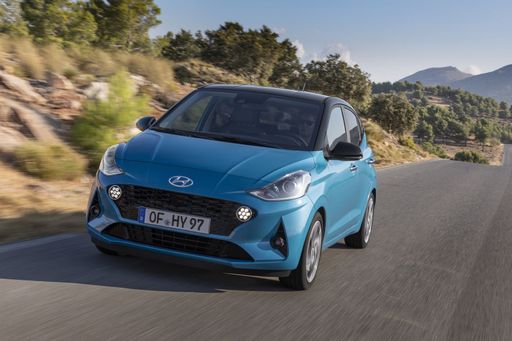 @ hyundai.news
@ hyundai.news
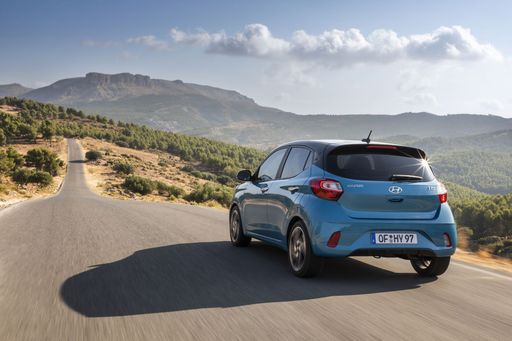 @ hyundai.news
@ hyundai.news
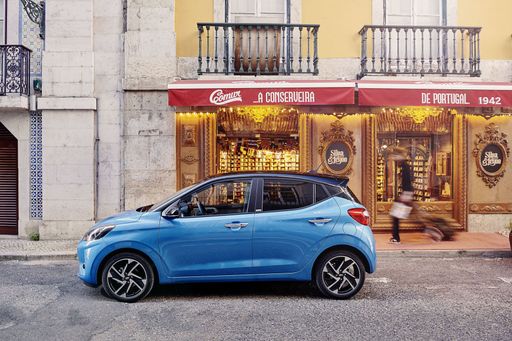 @ hyundai.news
@ hyundai.news
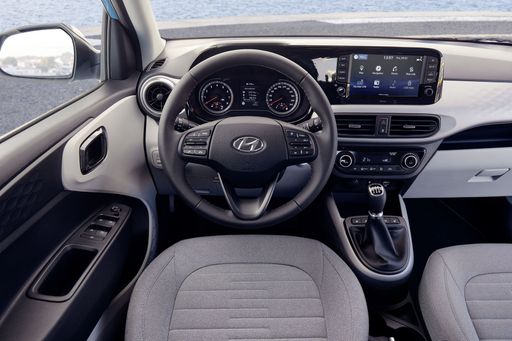 @ hyundai.news
@ hyundai.news
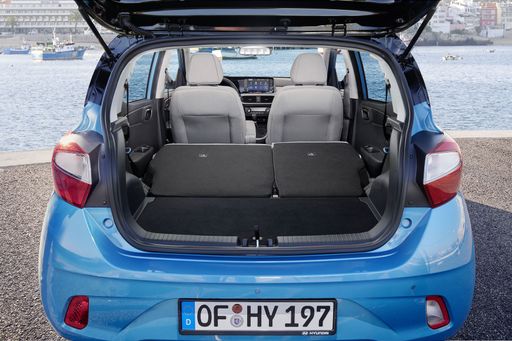 @ hyundai.news
@ hyundai.news
Toyota RAV4
The Toyota RAV4 stands out in the crowded SUV market with its distinct design, embodying a blend of robustness and style. Its cabin provides a harmonious fusion of comfort and practicality, offering plenty of space for both passengers and luggage. This vehicle is engineered to deliver a smooth driving experience, whether manoeuvring through city streets or exploring winding country roads.
details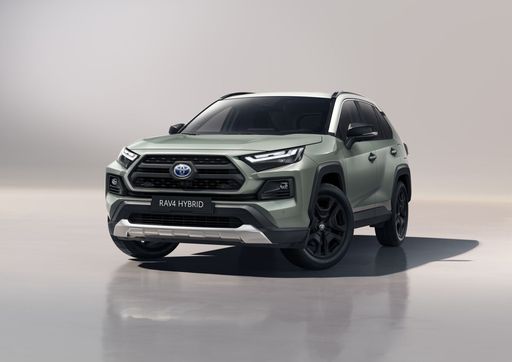 @ Toyota
@ Toyota
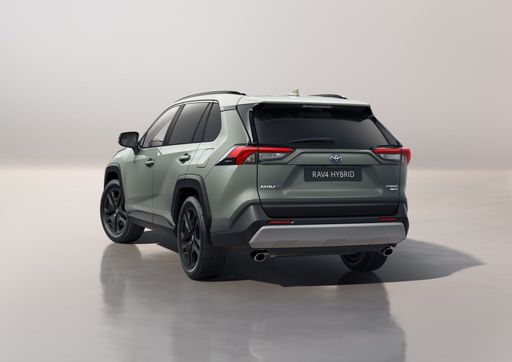 @ Toyota
@ Toyota
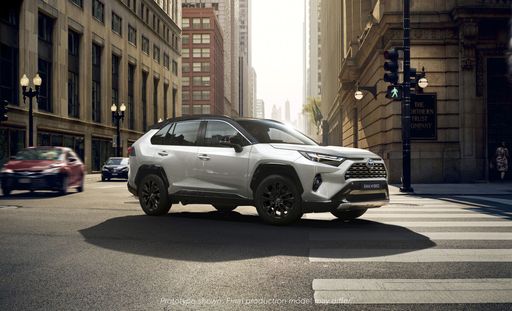 @ Toyota
@ Toyota
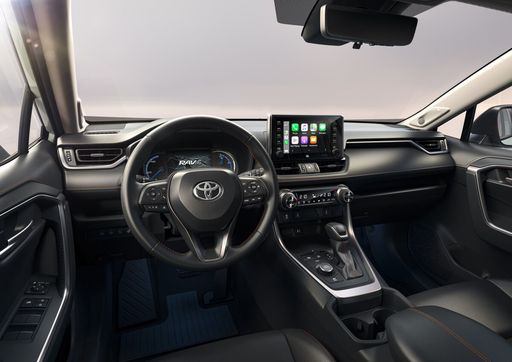 @ Toyota
@ Toyota

|

|
|
|
|
Costs and Consumption |
|
|---|---|
|
Price
14600 - 19000 £
|
Price
35100 - 55700 £
|
|
Consumption L/100km
4.9 - 5.5 L
|
Consumption L/100km
1 - 5.6 L
|
|
Consumption kWh/100km
-
|
Consumption kWh/100km
-
|
|
Electric Range
-
|
Electric Range
75 km
|
|
Battery Capacity
-
|
Battery Capacity
-
|
|
co2
110 - 124 g/km
|
co2
22 - 128 g/km
|
|
Fuel tank capacity
36 L
|
Fuel tank capacity
55 L
|
Dimensions and Body |
|
|---|---|
|
Body Type
Hatchback
|
Body Type
SUV
|
|
Seats
4 - 5
|
Seats
5
|
|
Doors
5
|
Doors
5
|
|
Curb weight
996 - 1099 kg
|
Curb weight
1745 - 1910 kg
|
|
Trunk capacity
252 L
|
Trunk capacity
520 - 580 L
|
|
Length
3670 - 3675 mm
|
Length
4600 mm
|
|
Width
1680 mm
|
Width
1855 mm
|
|
Height
1480 - 1483 mm
|
Height
1685 mm
|
|
Max trunk capacity
1050 L
|
Max trunk capacity
1604 - 1690 L
|
|
Payload
344 - 423 kg
|
Payload
390 - 600 kg
|
Engine and Performance |
|
|---|---|
|
Engine Type
Petrol
|
Engine Type
Full Hybrid, Plugin Hybrid
|
|
Transmission
Manuel, Automatic
|
Transmission
Automatic
|
|
Transmission Detail
Manual Gearbox, Automated Manual
|
Transmission Detail
CVT
|
|
Drive Type
Front-Wheel Drive
|
Drive Type
Front-Wheel Drive, All-Wheel Drive
|
|
Power HP
63 - 90 HP
|
Power HP
218 - 306 HP
|
|
Acceleration 0-100km/h
11.4 - 18.4 s
|
Acceleration 0-100km/h
6 - 8.4 s
|
|
Max Speed
143 - 175 km/h
|
Max Speed
180 km/h
|
|
Torque
93 - 172 Nm
|
Torque
-
|
|
Number of Cylinders
3 - 4
|
Number of Cylinders
4
|
|
Power kW
46 - 66 kW
|
Power kW
160 - 225 kW
|
|
Engine capacity
998 - 1197 cm3
|
Engine capacity
2487 cm3
|
General |
|
|---|---|
|
Model Year
2024
|
Model Year
2024 - 2025
|
|
CO2 Efficiency Class
C, D
|
CO2 Efficiency Class
D, B
|
|
Brand
Hyundai
|
Brand
Toyota
|
Is the Hyundai i10 offered with different drivetrains?
The Hyundai i10 is offered with Front-Wheel Drive.
The prices and data displayed are estimates based on German list prices and may vary by country. This information is not legally binding.
